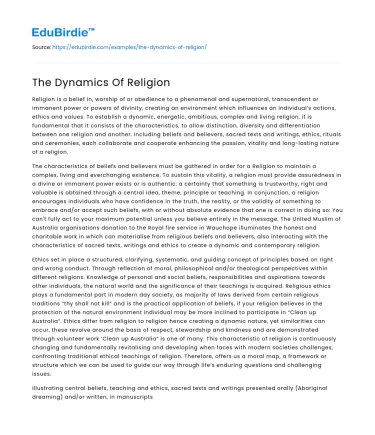Religion is a belief in, worship of or obedience to a phenomenal and supernatural, transcendent or immanent power or powers of divinity, creating an environment which influences an individual’s actions, ethics and values. To establish a dynamic, energetic, ambitious, complex and living religion, it is fundamental that it consists of the characteristics, to allow distinction, diversity and differentiation between one religion and another. Including beliefs and believers, sacred texts and writings, ethics, rituals and ceremonies, each collaborate and cooperate enhancing the passion, vitality and long-lasting nature of a religion.
The characteristics of beliefs and believers must be gathered in order for a Religion to maintain a complex, living and everchanging existence. To sustain this vitality, a religion must provide assuredness in a divine or immanent power exists or is authentic: a certainty that something is trustworthy, right and valuable is obtained through a central idea, theme, principle or teaching. In conjunction, a religion encourages individuals who have confidence in the truth, the reality, or the validity of something to embrace and/or accept such beliefs, with or without absolute evidence that one is correct in doing so: You can't fully act to your maximum potential unless you believe entirely in the message. The United Muslim of Australia organisations donation to the Royal fire service in Wauchope illuminates the honest and charitable work in which can materialise from religious beliefs and believers, also interacting with the characteristics of sacred texts, writings and ethics to create a dynamic and contemporary religion.
Save your time!
We can take care of your essay
- Proper editing and formatting
- Free revision, title page, and bibliography
- Flexible prices and money-back guarantee
Ethics set in place a structured, clarifying, systematic, and guiding concept of principles based on right and wrong conduct. Through reflection of moral, philosophical and/or theological perspectives within different religions. Knowledge of personal and social beliefs, responsibilities and aspirations towards other individuals, the natural world and the significance of their teachings is acquired. Religious ethics plays a fundamental part in modern day society, as majority of laws derived from certain religious traditions “thy shall not kill” and is the practical application of beliefs, if your religion believes in the protection of the natural environment individual may be more inclined to participate in “Clean up Australia”. Ethics differ from religion to religion hence creating a dynamic nature, yet similarities can occur, these revolve around the basis of respect, stewardship and kindness and are demonstrated through volunteer work ‘Clean up Australia” is one of many. This characteristic of religion is continuously changing and fundamentally revitalising and developing when faces with modern societies challenges, confronting traditional ethical teachings of religion. Therefore, offers us a moral map, a framework or structure which we can be used to guide our way through life’s enduring questions and challenging issues.
Illustrating central beliefs, teaching and ethics, sacred texts and writings presented orally (Aboriginal dreaming) and/or written, in manuscripts or other story forms (Bible, Torah) provide the foundational framework of religion. Sacred texts and writings are considered essential to the expression of fundamental truths, cultivating communal identity, communication with the divine and facilitating religious beliefs and practices. To support this passing on of information and knowledge, sacred text and writings are closely connected with beliefs and believers. Original beliefs and values were reflected within sacred texts of the time hence, influencing current generations and the dictation of modern social views. Sacred texts also encompass rituals and prayers important to a religious belief, containing rules and directions on how to approach life and the enduring questions surrounding it.
A ritual is a group of actions performed for their symbolic spiritual significance, although a ceremony is conducted to celebrate or for special occasions. A process by which the congregation of believers reignites control over there framework of beliefs and enables the practical implementation of the religious beliefs, ethics and sacred texts. Rituals and rituals are specifically connected to supernatural entities or powers by which a better comprehension of the true essence is achieved. Used within a ritual or ceremony, sacred texts and writings may be read, certain spiritual items of clothing may be worn, and items of divine symbolism may be beneficial for the practice. This is highlighted throughout the image of a Judaism ritual, where a boy reads from a scripture and is dressed in sacred clothing including a Kipa for customary requirements.
A dynamic, living religion is characterised as one that can be expressed in accordance with the needs of modern societies without compromising its core ideals and aspects, which is why religions through the characteristics are evolving and adapting.






 Stuck on your essay?
Stuck on your essay?

